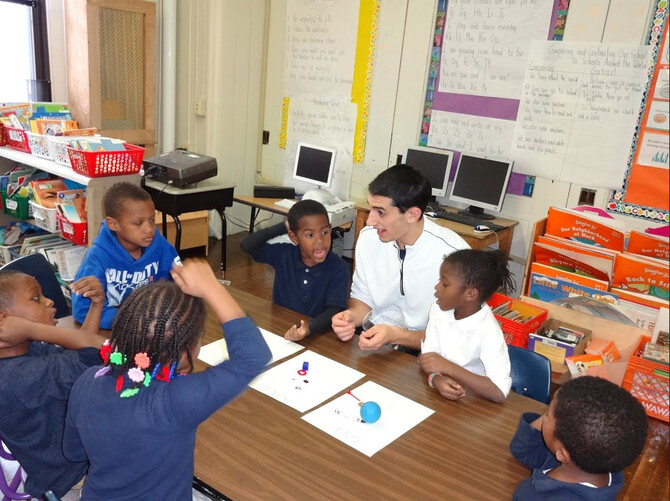Student Group at Penn Delivers On-site Science to Local Children
University of Pennsylvania senior Steve Scarfone and junior Jeffrey Ng are part of a local community-engagement project that mixes volunteering and increasing access to learning through Penn Science Across Ages.
A student-run organization, PSAA has been improving science education in West Philadelphia since 2008. The program teaches Penn students about inquiry-based teaching methods. Then, as PSAA Fellows, they prepare and deliver science lessons to youngsters at nearby schools.
Whether it’s at Henry C. Lea Elementary, the Science Leadership Academy or on Saturdays with classes for Upward Bound Math and Science, nearly 100 PSAA Fellows engage students with hands-on activities and interactive learning.
During the day at Lea, PSAA Fellows like Scarfone and Ng lead weekly classes using science kits to encourage learning by doing. The topics range from magnetism to electricity and from plant growth to photosynthesis, matching the standards and content areas specified by the School District of Philadelphia.
Scarfone, from Voorhees, N.J., has been involved with PSAA for more than three years. A biophysics major at the School of Arts & Sciences, he’s a fellow with the Lea day school program and an outgoing co-president of PSAA.
“The program has changed a great deal since I was a freshman,” Scarfone says. “The sense of accomplishment I get from continuing to help it function, grow and evolve is like a return on that invested time.”
He says another perk is immersing himself in the neighborhood while making an impact.
“By getting out into these schools and getting to know the children, their daily lives and the things they care about, I feel much more a member of the West Philadelphia community,” Scarfone says. “I love teaching and I love kids, so volunteering with PSAA is perfect. In addition, bringing science to a school that has little outside of what we provide is incredibly worthwhile.”
But, there are many different reasons among the PSAA Fellows for volunteering.
Ng, from Abington, Pa., an engineering major in the School of Engineering and Applied Science, is the PSAA president. As a section leader for the daytime program at Lea, he sees teaching science to kindergarteners as a stress reliever.
“Going to Lea to teach science is something I look forward to every week,” he says.
Ng, who mentored students on his high school’s robotics team, says PSAA gives Penn students an understanding of the challenges children face due to of a lack of resources. But it also gives Penn students the ability to make a tangible impact.
“PSAA allows me to volunteer in science education, which is what I enjoy doing the most," Ng says.
Ng hopes the Lea students will be inspired to explore science and technology careers in the future. He adds the interactive part is what makes the children’s discoveries more "sticky," allowing the lessons to stay with them.
“They may not remember your name, but they remember ‘the time we grew plants’ or ‘the time when we hatched butterflies,’” Ng says, adding that for kids these experiments are memorable because the things they learn from them have a direct connection to the real world.
“They might not have thought about why leaves change color, but after the trees unit they can explain these real-world phenomenon to their parents,” Ng adds. “If these experiences inspire a handful of students to take up careers in science and technology, we have been successful.”
The PSAA program expands well beyond the daylight hours. Penn’s Netter Center for Community Partnerships operates the Lea Community School, which provides 100 students with activities weekdays from 3:30 to 6 p.m. Nancylee Bergey from Penn’s Graduate School of Education, who donates her time to the group as its organizer, adds that PSAA provides the science content and activities for these sessions.
Penn students are also involved as fellows with the Science Leadership Academy, a high school that is a partnership between the School District of Philadelphia and the Franklin Institute. Penn’s SLA Fellows lead science mini-courses for 15 students at a time on Wednesday afternoons. In conjunction with the Franklin Institute’s current exhibit, they’re focusing on the human brain.
The organization’s work culminates during the spring Reading Days, when PSAA hosts an Environmental Festival at Lea Elementary which allows the school to focus on science all day. PSAA Fellows and other Penn volunteers are positioned at each station.
PSAA is expanding in 2015 to include more technology-centered volunteering opportunities. In cooperation with Penn’s General Robotics Automation, Sensing and Perception Lab, PSAA fellows will visit Philadelphia’s public high schools and serve as mentors for their robotics teams.








